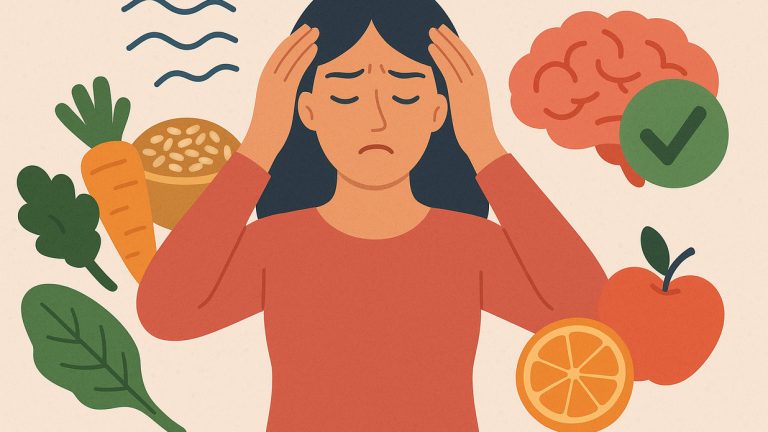From the Plate: Food and Calm
Stress is part of everyday life, but there are ways to ease its burden. One of the simplest and most effective steps is paying attention to what you eat. Proper nutrition not only fuels the body but also soothes the mind. Foods with balanced nutrients help keep your mood steady and your mind clear.
When your body receives adequate nourishment and maintains glycemic stability, it’s better equipped to handle challenges and unexpected changes. Your brain functions more smoothly, and emotions are less likely to spiral out of control. Eating well isn’t a cure-all for stress, but it greatly enhances your ability to make decisions, stay calm, and move forward.
In times when feelings feel overwhelming, returning to simple habits—like eating regular balanced meals—brings stability. You may not notice a difference right away, but over days and weeks you’ll feel the positive effects.
A Complete Breakfast for a Better Start
A day that begins with a solid breakfast tends to go more smoothly. Morning meals provide essential fuel for both body and mind. Skipping breakfast can make you more susceptible to irritability, brain fog, or unexplained fatigue.
Foods like eggs, oatmeal, and fruit deliver lasting energy without sudden crashes. They also support emotional health: fiber and protein help stabilize blood sugar, which is crucial for maintaining a balanced mood throughout the morning.
Relying on sugary or overly processed breakfast options can cause quick energy spikes followed by sharp drops. Instead, choosing natural, whole foods sets you up to face the day with both body and mind fully energized.
Balancing Blood Sugar: Avoid Spikes and Crashes
When blood sugar rises or falls too dramatically, you often end up feeling irritable, anxious, or drained. That’s why it’s important to include foods that slow sugar absorption—whole grains, vegetables, and nuts are prime examples.
With steady blood sugar, emotions remain more balanced, even under stress. You don’t need to eliminate carbohydrates entirely, but it’s best to choose sources that the body processes slowly. Foods like fruit, sweet potatoes, and brown rice are complex carbs that sustain energy over time.
By maintaining this balance, you’ll be less vulnerable to fatigue or agitation on busy days or when life throws unexpected challenges your way. Good nutrition lays a solid foundation for managing stress day after day.
Magnesium and Calm: Nature’s Relaxant
Magnesium is a mineral often overlooked but vital for relaxing muscles and calming the mind. You can find it naturally in leafy greens, whole grains, and nuts.
If you frequently feel tense or stiff, you may be low in magnesium. Symptoms like anxiety, trouble sleeping, or chronic fatigue can all point to this deficiency. Adding magnesium-rich foods to your diet gradually relieves these signs.
Regularly eating spinach, pumpkin seeds, or black beans is a simple way to support natural relaxation. You don’t need drastic changes—small additions can make a noticeable difference.
Omega-3 Fatty Acids: Clarity of Mind
Fish such as salmon, sardines, and mackerel are rich in omega-3 fatty acids, which support brain health and help reduce symptoms of depression and anxiety.
Including omega-3s in your regular diet fosters a more balanced mood and clearer thinking, even amid turmoil. While these fats don’t eliminate stress, they help you process emotions more effectively.
If you don’t eat fish often, alternatives like flaxseed, chia seeds, and walnuts can supply omega-3s. You might also consult a doctor about supplements if needed.
Hydration and Mental Clarity: Water for Focus
It may seem simple, but water profoundly affects how you feel. Dehydration can lead to irritability, poor concentration, and even anxiety without any obvious trigger.
Drinking enough water throughout the day is one of the first steps in stress management. Its impact is easy to overlook, but you’ll feel noticeably better once it becomes a habit.
Sip before you feel thirsty. Carry a reusable bottle, and aim for a drink every hour. These small actions make a big difference in emotional well-being and mental clarity.
Avoid Excessive Caffeine and Sugar
While caffeine gives a quick jolt of energy, too much can worsen nervousness and anxiety. The same goes for sugar: a brief high is often followed by fatigue and lack of motivation.
Focusing on sources of sustained energy rather than sudden boosts is better for your mood. Herbal teas, water with lemon, or fiber-rich smoothies offer gentler, more lasting support.
You don’t have to eliminate caffeine or sweet treats completely, but cutting back and timing your intake can help stabilize how you feel.
Sleep and Nutrition: Interconnected Habits
Lack of sleep weakens your ability to control food choices, leading to cravings for sugary or fatty foods. Conversely, poor nutrition can disrupt sleep quality.
Eating a light, balanced meal at night promotes better rest. Avoid overly salty or greasy dishes before bedtime. Foods like bananas, yogurt, and oatmeal are gentle on the stomach and encourage sleep.
By tending to both diet and sleep together, you strengthen your resilience and face daily stressors with more confidence.
Food as the Foundation of Your Day
Starting your day with balanced meals and proper hydration sets the tone for a more structured, less stressful routine. A nutrient-rich breakfast—such as Greek yogurt topped with fruit and whole-grain granola or a veggie-packed omelet—fuels both body and mind, helping you tackle tasks with greater focus and energy. Pairing this with a full glass of water or an electrolyte-infused beverage jumpstarts your metabolism and supports optimal cognitive function from the very first hour.
Healthy eating isn’t about adhering to rigid rules or denying yourself pleasures; it’s about building sustainable, intentional habits. Incorporating plenty of colorful vegetables, whole grains, and lean proteins into your meals ensures you receive a broad spectrum of vitamins and minerals. At the same time, mindful choices—like swapping sugary snacks for fresh fruit or sipping water instead of sweetened drinks—encourage long-term well-being without triggering feelings of restriction.
When stress feels overwhelming, the path to relief often starts with what’s on your plate and in your glass. By choosing nourishing foods and staying well-hydrated, you strengthen your body’s resilience to daily pressures and support balanced mood regulation. Every mindful bite and sip becomes an act of self-care, reinforcing the idea that true stress management is rooted in the simple, everyday decisions you make for your health.




